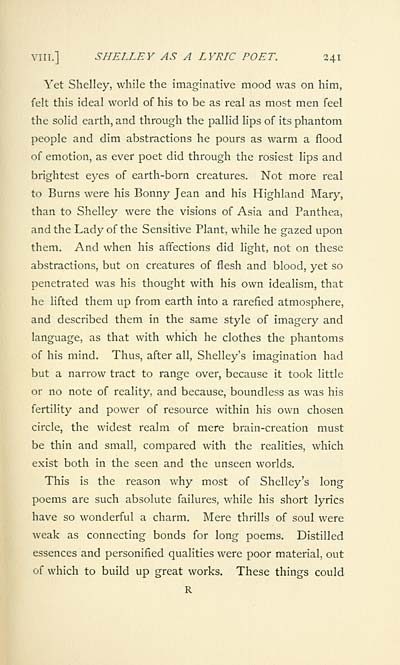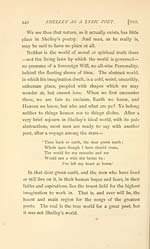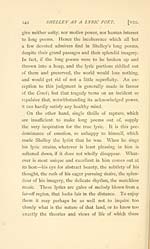Ossian Collection > Aspects of poetry
(257)
Download files
Complete book:
Individual page:
Thumbnail gallery: Grid view | List view

VIII.] SHELLEY AS A LYRIC POET, 241
Yet Shelley, while the imaginative mood was on him,
felt this ideal world of his to be as real as most men feel
the solid earth, and through the pallid lips of its phantom
people and dim abstractions he pours as warm a flood
of emotion, as ever poet did through the rosiest lips and
brightest eyes of earth-born creatures. Not more real
to Burns were his Bonny Jean and his Highland Mary,
than to Shelley were the visions of Asia and Panthea,
and the Lady of the Sensitive Plant, while he gazed upon
them. And when his affections did light, not on these
abstractions, but on creatures of flesh and blood, yet so
penetrated was his thought with his own idealism, that
he lifted them up from earth into a rarefied atmosphere,
and described them in the same style of imagery and
language, as that with which he clothes the phantoms
of his mind. Thus, after all, Shelley's imagination had
but a narrow tract to range over, because it took little
or no note of reality, and because, boundless as was his
fertility and power of resource within his own chosen
circle, the widest realm of mere brain-creation must
be thin and small, compared with the realities, which
exist both in the seen and the unseen worlds.
This is the reason why most of Shelley's long
poems are such absolute failures, while his short lyrics
have so wonderful a charm. Mere thrills of soul were
weak as connecting bonds for long poems. Distilled
essences and personified qualities were poor material, out
of which to build up great works. These things could
R
Yet Shelley, while the imaginative mood was on him,
felt this ideal world of his to be as real as most men feel
the solid earth, and through the pallid lips of its phantom
people and dim abstractions he pours as warm a flood
of emotion, as ever poet did through the rosiest lips and
brightest eyes of earth-born creatures. Not more real
to Burns were his Bonny Jean and his Highland Mary,
than to Shelley were the visions of Asia and Panthea,
and the Lady of the Sensitive Plant, while he gazed upon
them. And when his affections did light, not on these
abstractions, but on creatures of flesh and blood, yet so
penetrated was his thought with his own idealism, that
he lifted them up from earth into a rarefied atmosphere,
and described them in the same style of imagery and
language, as that with which he clothes the phantoms
of his mind. Thus, after all, Shelley's imagination had
but a narrow tract to range over, because it took little
or no note of reality, and because, boundless as was his
fertility and power of resource within his own chosen
circle, the widest realm of mere brain-creation must
be thin and small, compared with the realities, which
exist both in the seen and the unseen worlds.
This is the reason why most of Shelley's long
poems are such absolute failures, while his short lyrics
have so wonderful a charm. Mere thrills of soul were
weak as connecting bonds for long poems. Distilled
essences and personified qualities were poor material, out
of which to build up great works. These things could
R
Set display mode to: Large image | Transcription
Images and transcriptions on this page, including medium image downloads, may be used under the Creative Commons Attribution 4.0 International Licence unless otherwise stated. ![]()
| Early Gaelic Book Collections > Ossian Collection > Aspects of poetry > (257) |
|---|
| Permanent URL | https://digital.nls.uk/78388356 |
|---|
| Description | Selected books from the Ossian Collection of 327 volumes, originally assembled by J. Norman Methven of Perth. Different editions and translations of James MacPherson's epic poem 'Ossian', some with a map of the 'Kingdom of Connor'. Also secondary material relating to Ossianic poetry and the Ossian controversy. |
|---|
| Description | Selected items from five 'Special and Named Printed Collections'. Includes books in Gaelic and other Celtic languages, works about the Gaels, their languages, literature, culture and history. |
|---|

